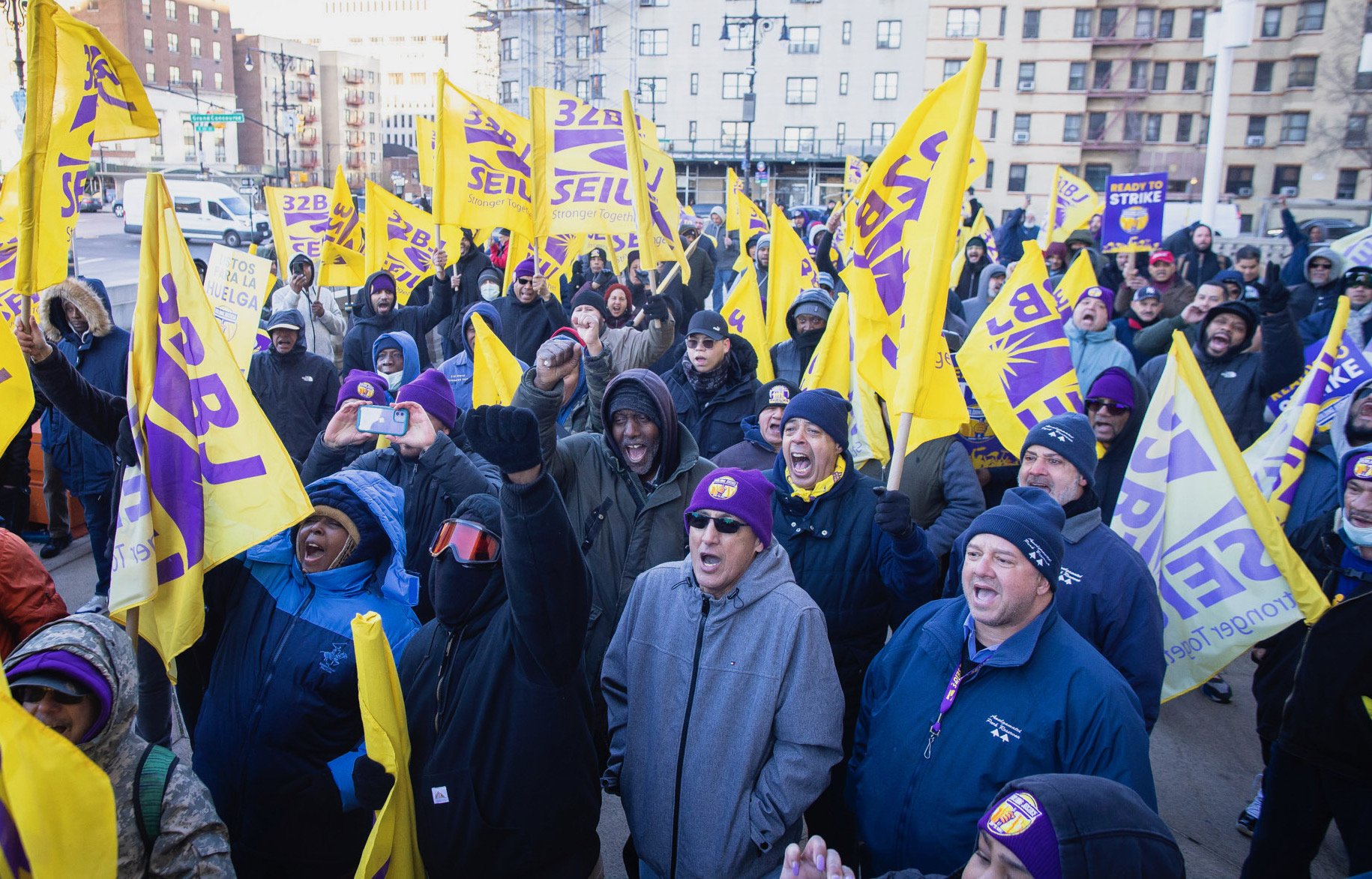Bronx Landlords Back Off On Union Concessions; Demand Rent Hikes From Albany
By Steve Wishnia
A Bronx landlord trade group has decided that it will not reopen its contract with 32BJ SEIU and seek concessions from the building-service workers union.
The Bronx Realty Advisory Board (BRAB) informed the union of its decision in a letter on the night of April 1, 32BJ President Manny Pastreich told Work-Bites. The four-year agreement, reached in March 2023, covers workers such as doormen, doorwomen, superintendents, and porters in the borough.
“This was a hard process, but we’re glad we achieved a solution,” Pastreich said.
“In the spirit of cooperation, both parties call on Albany legislators to find solutions to create more affordable housing, and allow for the reinvestment in affordable housing in the Bronx and beyond,” 32BJ and BRAB said in a joint statement. “This means 1,400 essential building service workers who work across 430 buildings in the Bronx now have the security of a continued contract that will afford them fair wages and benefits for the next three years.”
A provision in the contract, added at the last minute during the 2023 talks, allowed reopening it after one year if economic conditions remained unfavorable. BRAB told 32BJ in February that it was going to do that, but after talks with the union, it agreed to hold off until April 1. If BRAB had reopened the contract then, it would have started the 30-day countdown to the strike deadline the Bronx workers authorized last month.
The owners had wanted that provision added, 32BJ officials say, because they feared that the collapse of Signature Bank, just two days before the deadline, might cause them unexpected financial problems. The bank had held a lot of Bronx real-estate refinancing. Building owners, the joint statement said, have faced “rising interest rates and other economic impacts that have made investing in their buildings more difficult.”
But 32BJ didn’t want to reopen the deal and risk having to make concessions. The 2023 agreement included raises of about 3% a year and preserved workers’ free health coverage, but during the negotiations for it, BRAB had sought a wage freeze and having workers pay part of their health-insurance premiums.
Free health coverage is a crucial benefit for Bronx building workers, whose wages start at as low as $17.50 an hour. One superintendent told Work-Bites before the March 21 strike vote that it was “a matter of life and death” for his 20-year-old daughter.
“The stress is on both sides,” Pastreich told Work-Bites. “We came to a fair deal, and we realized that reopening it wasn’t going to fix those stresses.”
“There are policy solutions on the table that create a sustainable future for all parties,” the joint statement said. “32BJ and the BRAB unite to call for regulations that will preserve affordability for NYC renters, and provide a sustainable future for owners of affordable housing. As budget negotiations continue in Albany, we call on lawmakers to pass a comprehensive housing package that addresses these concerns.”
Housing issues
“Our issues are with Albany — not the union or its membership. Rising interest and insurance rates, problems with vacancies, Housing Court, collection of arrears, and a host of others coming out of the 2019 Housing Stability and Tenant Protection Act have created a hostile environment for property owners throughout New York City— but especially here in the Bronx,” Billy Schur, president of BRAB, said in a separate statement. “Albany and the union leadership need to face the facts: These older buildings will not be able to stay afloat if current restrictions are not adjusted.”
Current proposals in Albany to ease those restrictions include letting landlords of rent-stabilized apartments raise rents to the federal “fair market rate”—$2,451 a month for a one-bedroom apartment—when a longtime tenant moves out, and allowing much larger increases for apartment renovations. The 2019 law strictly limited renovation increases, as many had been fraudulently high.
Enabling landlords to raise rents more creates a paradox for 32BJ: They would have more money to pay building workers, but the workers would have a much harder time finding housing they can afford. If someone making $58,000 a year is paying $2,000 rent, that eats up more than 40% of their income.
From the union’s side, Pastreich says, a comprehensive housing package should aim to increase the housing supply. That would include reviving the 421(a) program, while directing its residential-construction subsidies toward affordable housing, and converting unused commercial buildings to residential use—which could also create jobs for 32BJ members. Another issue with the 421(a) program is whether owners should have to make labor-peace agreements to receive the subsidies—both for construction and for building services in the finished project.
The package, Pastreich adds, should also include tenant protections, although he doesn’t explicitly endorse “good cause” legislation, which would prohibit landlords in all but the smallest buildings, not just those covered by rent regulations, from evicting tenants without a specific reason such as not paying their rent. “Elements of it are important,” he says, and any measure passed should include reasonable rent caps, so people don’t get hit with 20% increases when they renew their leases.

